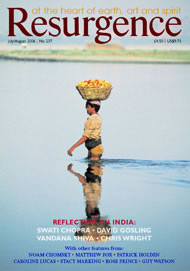AFTER THE DISSOLUTION of the Soviet Union it was propounded that we had reached “the end of history” and that a liberal capitalist democracy was the only alternative to communism. A minority differed from this view and talked about a third way, between socialism and capitalism. Many, especially in the non-Western world, feel that a plurality of paths – of ecological and political development in harmony with local environments and cultures – should be allowed to flourish. This is the call that is being made from the platform of the World Social Forum. The environmental, women’s and peace movements are trying to provide an alternative by combining the local and the global and at the same time allowing space for indigenous pluralism. Vandana Shiva’s Earth Democracy is both a vision and a manifesto as part of the social movement’s search for alternatives in order to propose that another world is possible.
Shiva is a strong, eloquent personality, combining activism and intellect of a high order both at the local village level in India and at the greatest alternative forums on the global stage. She feels equally at home with peasant women in the remote Himalayas, and at nuanced scientific discussions about agricultural technology and international patent laws. It is therefore interesting to see how she weaves together different threads into a holistic vision.
Shiva begins with laying down the principles of Earth Democracy:
1. All species, peoples and cultures
have intrinsic worth.
2. The Earth community is a democ-
racy of all life.
3. Diversity in nature and culture must be defended.
4. All beings have a natural right to sustenance.
5. Earth Democracy is based on living economies and economic
democracy.
6. Living economies are built on local economies.
7. Earth Democracy is a living democ- racy.
8. Earth Democracy is based on living cultures.
9. Living cultures are life-enhancing.
10.Earth Democracy globalises peace,
care and compassion.
In the next four chapters Shiva discusses the meaning and process of living economies, living democracies, living cultures and Earth Democracy in action. She does so with her unique blend of critique of corporate globalisation, hidden connections, analysis and activist passion.
Living economies create systems whereby the Earth’s resources and commons – particularly food and water – are equitably shared, and meaningful livelihoods are supported. The basis for Earth Democracy emerges from the consciousness that while we are rooted locally we are also connected to the wide world, indeed to the universe. Globalisation needs to be based on ecological processes and bonds of compassion and solidarity and not on the movements of goods and services. Earth Democracy provides a paradigm shift or an alternative worldview in which love, compassion, ecological responsibility and economic justice replace greed, consumerism and competition, as aims of human life.
In conclusion, Shiva provides several examples of Earth Democrary in action, symbolised by the struggle for three main types of swaraj or democracy: bija swaraj or seed democracy; anna swaraj or food democracy, and jal swaraj or water democracy. Shiva suggests we work towards an Earth Democracy through civil disobedience, nonviolence and non-cooperation. Such small struggles and initiatives become “powerful against large scale domination because small victories can be claimed by millions”.
It should be noted that the author – whilst connecting the different values of social justice and equity, economic and political democracy, ecological sustainability, gender equity and peace – sometimes misses the need for priorities in different cultural, economic and ecological contexts. What happens if there is a conflict between social justice and environmental preservation, for instance? Or if there is a conflict between different cultural values and between different species?
These minor issues should not distract us from the main thrust of the book: that democracy is not only a political and economic system as proposed in the Western liberal tradition, but it is also an ecological and planetary consciousness as celebrated universally in many traditional communities wherein the Earth is an abode of the family of all beings, and nature is interconnected by love, compassion and co-operation.
Prahlad Shekhawat is Director of the Alternative Development Center, Jaipur, India.







